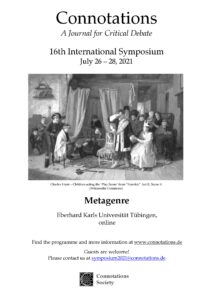Metagenre

Interesting examples of metagenre go far beyond the simple strategy of either opposing or endorsing genre conventions. […] [T]hey may bring different genres (and different attitudes to these genres) into play. In A Midsummer Night’s Dream, for instance, Shakespeare dismisses satire and parodies tragedy, while simultaneously defining and defending his own brand of comedy. A metageneric statement may also be at odds with what a text does, in the manner of the liar paradox. Like the Cretan who says that Cretans are liars, a text may repudiate a genre while simultaneously practicing it. […] The various explicit and implicit instances of metagenre in a text may also contradict each other, and they may change in the course of a text (as they do in Bauer’s examples, which initially reject but ultimately embrace the sonnet conventions). The most rewarding cases of metagenre create a complex and dynamic debate, a concert of critical and affirmative voices through which a text ultimately achieves a sense of itself.
From: Burkhard Niederhoff, “An Introduction to Metagenre with a Postscript on the Journey from Comedy to Tragedy in E. M. Forster’s Where Angels Fear to Tread“
Articles in this special issue
- An Introduction to Metagenre with a Postscript on the Journey from Comedy to Tragedy in E. M. Forster's Where Angels Fear to Tread
Burkhard Niederhoff
Connotations Vol. 31: 1-32 - Parodies of Six-Word Stories: A Comic Literary Metagenre1)
David Fishelov
Connotations Vol. 31: 33-55 - Meta-Epic Reflection in Twenty-First-Century Rewritings of Homer, or: The Meta-Epic Novel
Lena Linne
Connotations Vol. 31: 56-84 - Romance and Metagenre: A Response to Burkhard Niederhoff
Francesca Pierini
Connotations Vol. 31: 100-111 - Blaming Helen in Twenty-First Century Myth Writing: A Response to Lena Linne
Shelby Judge
Connotations Vol. 31: 126-132 - Tragedy and Trauerspiel: John Webster’s The Duchess of Malfi2)
Anny Crunelle-Vanrigh
Connotations Vol. 31: 160-188